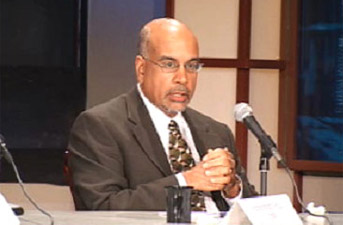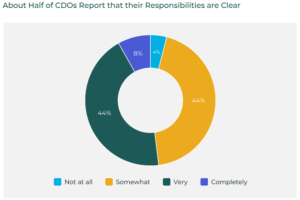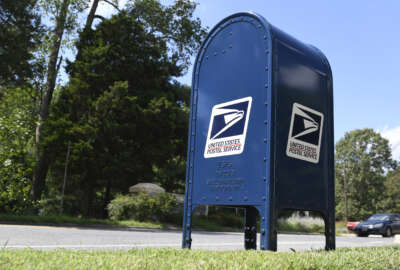 Exclusive
Exclusive Survey: Half of federal chief data officers are unclear about responsibilities
Congress established the chief data officer role in 2018. Four years later, half of those surveyed don’t think their responsibilities are clear.
Chief data officers in federal agencies have been in the government for a long time, but that doesn’t mean they are clear on their responsibilities. That’s according to a recent survey of CDOs conducted by the Data Foundation.
The chief data officer role in federal agencies was established in 2018 by an act of Congress. In the four years since, the Data Foundation has conducted surveys of the people who fill these roles responsible for data governance. This year, the survey sponsored by Guidehouse found that while CDOs tend to have had lengthy careers in the federal government — 80% have worked in federal government for 10 or more years — only about half of them think their responsibilities are clear. That’s a drop off from last year’s figure when 75% reported that they thought their responsibilities were clear.

“I will say that one of the reasons why the Evidence Act was written the way that it was is because … it was intentional, that it was not clear,” Katy Rother, senior advisor for federal policy implementation at the Data Foundation said at a webinar going over the results of the survey on Nov. 1. “It was not specified, I guess I should say, as to where the CDO would sit in an agency so that there is flexibility because we don’t know how to work. We’re all going on this journey together in developing these positions. I think, as the role matures, having guidance about what works and what is needed from these positions is helpful so that there’s… so the agencies are getting the feedback that they need. But I think the issue of having like one more person in the room as opposed to all of the other OMB positions that exist, they’re not putting out this guidance.”
The survey also found that 22% of CDOs report that they do not have the resources necessary to achieve their mission. An additional 61% reported that they only “somewhat” have the resources necessary to be successful. To address that, respondents identified some areas where support is necessary, including more support from the Office of Management and Budget and greater clarity about their role and the different expectations of chief data officers versus chief information officers.
“So we found that CDOs, they wear many hats and one of the hats that they wear is that they collaborate with several different stakeholders both within their agency and outside of their agency. So they collaborate with the general public, different internal stakeholders across different agencies, and also with folks within their own agencies,” Lori Gonzalez, senior policy and research analyst at the Data Foundation said. “Most of the CDOs, they reported two different stakeholder engagements that they’re largely engaged in. The first was public presentations, and also making front facing data products and visualizations available.”
The Data Foundation issued recommendations based on the results of the survey. Their first one is to Congress, saying that CDO funding flexibilities should be increased and that CDOs should be provided more direct resources. The survey found that 83% of CDOs report that they do not have adequate resources to fulfill their statutory responsibilities and support agency missions.
Jason Duke, the chief data officer at the U.S. Fish and Wildlife Service, spoke at the Data Foundation’s webinar and offered his insights as a CDO. An area of improvement he identified is reducing the duplication of efforts.
“I would think, for us to do fewer duplicative tasks, it’s going to involve better education of CDOs as far as what the benefits are of everything we’re asked to do, and not just that somebody’s got to offer those tools that don’t cost us more to subscribe to, then we can make it ourselves,” Duke said. “Because people always say, ‘Why should I pay X dollars for system A that somebody’s got, when I’ve got this whiz person over here who can build that for a tenth of that and it’ll be so much more in tune to just our needs, right? So you have to make us feel part of the solution, and not part of the problem. It’s kind of a psychological mind game, but to achieve a good purpose.”
As for whether the recommendations will be implemented, Rother isn’t optimistic.
“I don’t think that … the recommendations and the focus on data governance is going to change all that much based off of the outcomes of the election. That’s because it doesn’t get that much attention in the first place,” Rother said. “And so the major thing is whether or not you’re going to have the advocates in Congress. And most of the ones that I can think of are retiring or have retired.”
Copyright © 2024 Federal News Network. All rights reserved. This website is not intended for users located within the European Economic Area.
Robert O’Shaughnessy is a digital editor of Federal News Network.
Follow @rposhaughnessy





